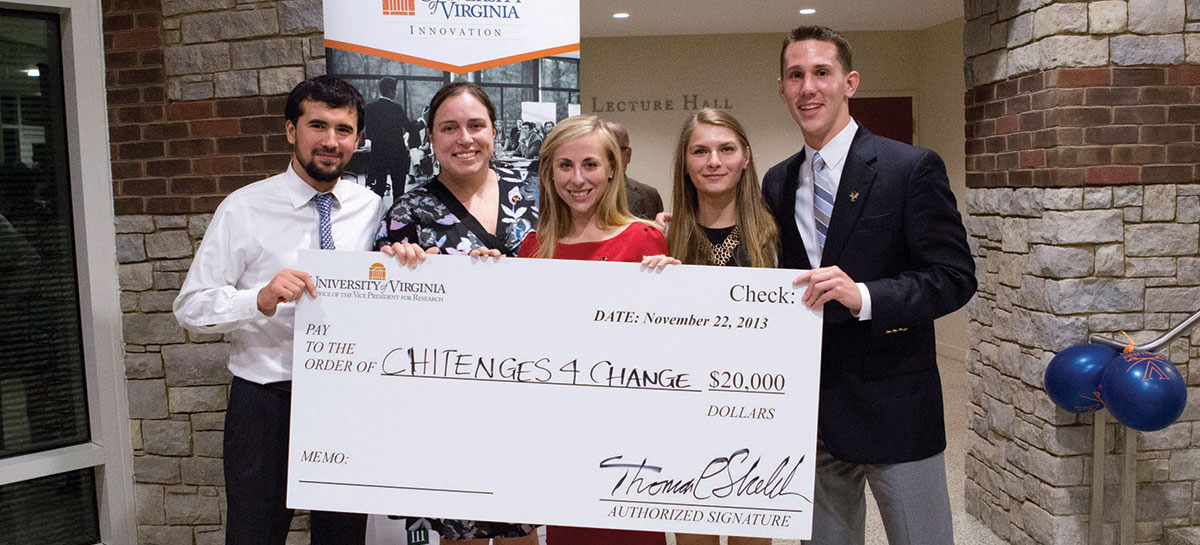FOUR TEAMS OF U.VA. STUDENTS divvied up $40,000 in prize money at the annual University of Virginia Entrepreneurship Cup this past November. The $20,000 first-place check went to the “Chitenges 4 Change” team, a group of five Batten MPP candidates who addressed a public health issue affecting almost half a billion women in the developing world.
For these women, who reside at the bottom of the global income pyramid and earn less than $1.25 per day, feminine hygiene products like disposable sanitary pads and tampons are far too costly to use regularly, team member Jennifer Casto said.
Without these products, women are forced to regularly miss school and work, said Casto, who observed the issue in Zambia while teaching English as a Peace Corps volunteer. Some Zambian women turn to rags, bags, mud or other homemade solutions that lead to health problems, including infections and cervical cancer.
“When a girl doesn’t have access to sanitary pads, her health, education and economic status are all negatively affected, simply because she has periods,” Casto said.
To address this problem, the team designed washable, reusable sanitary pads made of 100-percent cotton. The fabric comes from locally sourced chitenges, colorful African garments that are similar to sarongs, explained team member Bailey Morton. Soft and comfortable, the “Chitenges 4 Change” pads feature button wings to secure them in place, along with an inner lining pad made of six layers of absorbent fabric that can be removed and washed.
A three-pack of the reusable pads should cost about $1.50 and last one woman an entire year, replacing the need for 180 disposable pads totaling $54. In Zambia, where 60 percent of the population lives on less than $1 per day, this cost differential will be “life-changing,” Morton said, for more than 2 million girls and women between the ages of 14 and 54. Globally, roughly 420 million women face the same challenges.
“We all knew this was a problem because we have all lived overseas,” Morton explained after the winners were announced, noting that three of the team members had worked overseas in the Peace Corps. While Casto served in Zambia, Morton taught English and art in Azerbaijan and helped a women’s NGO develop a nationwide anti-domestic violence network. Team member Christopher Palmer served in the Peace Corps as a Youth as Promise Adviser for two years, teaching at-risk youth life skills in Jamaica.
The group plans to launch the product in Zambia, producing the pads by partnering with in-country tailoring schools. They will distribute them via local women’s groups, a peer-to-peer marketing model used in many developing countries, team member Ilgiz Saubanov explained.
“Nobody is thinking about the bottom of the income pyramid,” Saubanov said. “Men are running the businesses, and this is a taboo issue. Nobody is thinking of market-based solutions to address this, and it’s a pretty simple solution.”
“The E-Cup brought us together and made us think about this in a business context,” team member Alex Dumitriu added.
U.Va. vice president for research Thomas C. Skalak affirmed the importance of these kinds of discoveries. “As a university, we really only have three jobs: educating students, creating new knowledge and moving knowledge into the world where it can make a difference for people,” he said. “That’s what innovation is all about, and that’s what the E-Cup is all about. This is one of the most meaningful things that we do.”
RELATED CONTENT
A video created by the “Chitenges 4 Change” team illustrates the problem and their innovative response.
